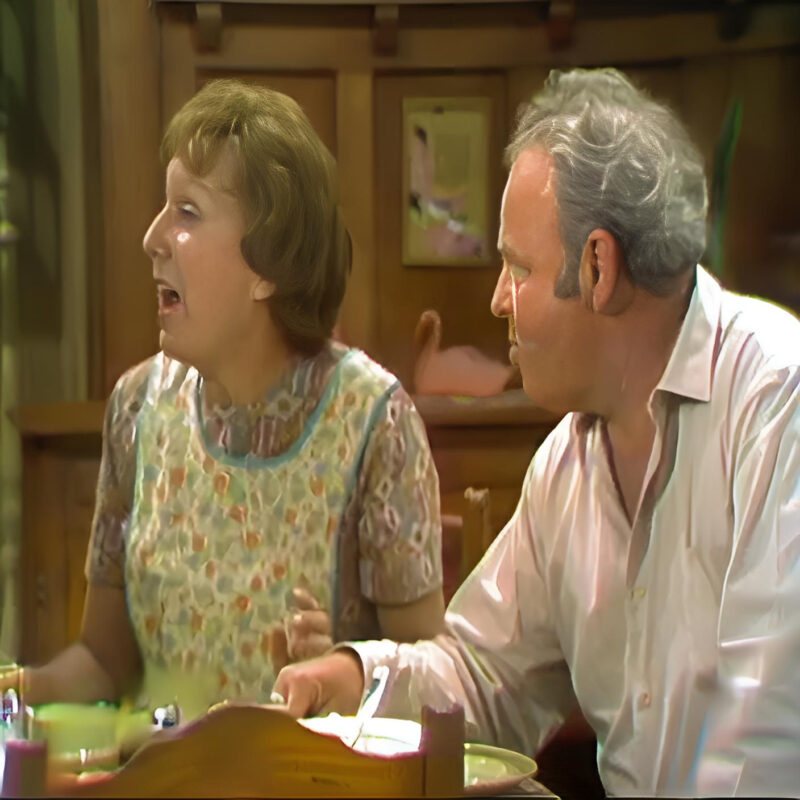
In the “All in the Family” episode “Archie the Hero” (September 29, 1975), the famously bigoted Archie Bunker (Carroll O’Connor) finds himself in an unexpected situation. After saving an unconscious woman in the back of his taxi by performing mouth-to-mouth resuscitation, Archie is later surprised when the woman, Beverly LaSalle (Lori Shannon), comes to thank him. To Archie’s shock, he discovers that Beverly is a man in women’s clothing. As was typical for “All in the Family,” Archie must confront and struggle with his prejudices, coming to terms with the fact that he, gasp, put his mouth on another man’s mouth. Lori Shannon was, incidentally, the drag queen persona of stand-up comedian Don Seymour McLean, a well-known figure in the comedy scene until his death in 1984.
In “Archie the Hero,” Edith (Jean Stapleton) immediately takes a liking to Beverly, and they quickly become friends. Archie remains uncomfortable but begrudgingly accepts his wife’s new friend. Beverly’s character returned in the episode “Beverly Rides Again” (November 6, 1976), where her drag persona is used to prank Archie’s annoying friend Pinky (Eugene Roche).
However, Beverly’s story takes a tragic turn in the intense episode “Edith’s Crisis of Faith” (December 18, 1977). During Christmastime, while walking with Mike (Rob Reiner), Beverly is attacked by a gang of bigoted homophobes and beaten to death. This brutal act deeply affects Edith, leading her to lose her faith in God; she cannot fathom why a loving God would allow such hate to exist.
In a 2014 interview with Deadline, show creator Norman Lear expressed his admiration for the episode, praising its sensitive handling of homophobia and a crisis of faith.
Edith’s Crisis of Faith
Edith losing her faith was a significant plotline in “All in the Family,” given her previously devout nature. It was also rare for a beloved character to be killed off. Norman Lear reflected on how Beverly’s character was introduced to the Bunker household and the profound impact her death had on Edith.
Lear explained the difficulty in concluding the story, revealing the behind-the-scenes discussions:
“So, Archie was confronted with having put his mouth to [a man’s], but Edith fell in love with him/her, and we did a couple of shows after that where she was a guest. What could cause Edith Bunker to lose her faith? I thought, ‘This character is killed for being who she was.’ Edith couldn’t imagine a God that could allow that. She lost her faith in one episode. Now, we couldn’t air that episode until we knew how she regained it. It didn’t have to be successive, but she had to regain her faith.”
Given that Archie Bunker was an old-world conservative who took Christianity seriously, Edith becoming an atheist would have fundamentally changed the series’ central dynamic. Lear felt pressure to return “All in the Family” to its status quo, which meant Edith had to at least partially regain her faith.
Paradise Regained?
Edith’s faith was not only a personal journey but also a narrative demand from the network. When asked if he and the network were aligned, Lear said:
“Oh, there was no question. Her loss of faith was significant. We couldn’t figure out how she would get it back. We sat around and talked about it. Weeks later, someone asked, ‘What happens to Archie when she loses her faith?’ The answer was inherent: she had to regain it to save him because he depended on a strong Edith.”
It’s unfortunate that Edith couldn’t fully explore her faith journey after the death of a loved one. It’s even more tragic that Beverly had to die. Nonetheless, Jean Stapleton and Carroll O’Connor delivered powerful, mournful performances, profoundly affected by Beverly’s death and the hateful injustice that led to it. Many viewers, especially those from marginalized communities, recall Beverly as one of the first openly queer characters in popular media who wasn’t demonized.
Beverly’s death mirrored the real-life violence queer people faced daily. Just a few years before Beverly’s introduction on “All in the Family,” the UpStairs Lounge, a queer club in New Orleans, was burned down, resulting in 32 deaths and 15 injuries. Incidents of “gay bashing” were common. “All in the Family” bravely addressed the violence occurring just outside viewers’ doors, a message that remains timely in 2024.
